OFFENBACH’S REQUIEM
Just as Wolfgang Amadeus Mozart died in the middle of writing his famous Requiem so did Jacques Offenbach die composing his fantastical opera Tales of Hoffmann. Both works have been seen as highly personal compositions: Mozart writing his own requiem and Offenbach standing in for Hoffmann, his protagonist. 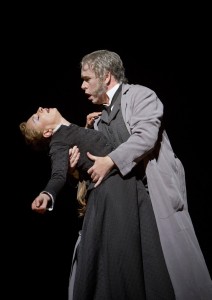 The similarities do not end there, however. The Requiem and Tales of Hoffmann can both be seen as new departures musically for their composers, who tackle more macabre themes and styles. Both unfinished compositions have also provided plenty of manuscript material for publishers, composers and musicologists to complete, revise, rewrite and print. In consequence, few audiences ever see the same version performed twice.
The similarities do not end there, however. The Requiem and Tales of Hoffmann can both be seen as new departures musically for their composers, who tackle more macabre themes and styles. Both unfinished compositions have also provided plenty of manuscript material for publishers, composers and musicologists to complete, revise, rewrite and print. In consequence, few audiences ever see the same version performed twice.
The version of Offenbach’s Tales of Hoffman currently in an enchanting production at San Francisco Opera is that of Jean-Christophe Keck and Michael Kaye (the Keck-Kaye edition). Without going into too many details, one can say that it tries to be faithful to Offenbach’s surviving manuscripts without being fastidious about it. Some remarkable features include the use of spoken dialogue rather than sung recitative and the inclusion of three Hoffman stories. Therefore, it lasts nearly three and a half hours, including two intermissions.
Tales of Hoffmann reimagines the life and loves of writer E.T.A. Hoffmann. Its structure is quite transparent: a prologue and epilogue frame three of Hoffmann’s stories. In the prologue, we learn that Hoffmann (played by tenor Matthew 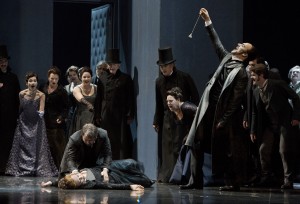 Polenzani) has been unlucky in love. He is visited by the muse of poetry (mezzo-soprano Angela Brower), who disguises herself as the young man Nicklausse. As such, she wants Hoffmann to forsake all other loves for her, including his current love interest, Stella (soprano Jacqueline Piccolino). Although the two do not work in concert, the muse is aided, in a way, by the nefarious Lindorf (bass-baritone Christian van Horn), who is a rival for Stella’s affections. Lindorf and Nicklausse, therefore, can be seen as competing influences on the protagonist Hoffmann, the former evil and the latter good.
Polenzani) has been unlucky in love. He is visited by the muse of poetry (mezzo-soprano Angela Brower), who disguises herself as the young man Nicklausse. As such, she wants Hoffmann to forsake all other loves for her, including his current love interest, Stella (soprano Jacqueline Piccolino). Although the two do not work in concert, the muse is aided, in a way, by the nefarious Lindorf (bass-baritone Christian van Horn), who is a rival for Stella’s affections. Lindorf and Nicklausse, therefore, can be seen as competing influences on the protagonist Hoffmann, the former evil and the latter good.
While Hoffmann waits at Luther’s tavern for Stella to finish singing her role in Mozart’s Don Giovanni, he is goaded into telling three stories concerning past loves. All three are fictional short stories written by Hoffmann, but here reinterpreted as autobiographical stories. First, is the story of Olympia (soprano Hye Jung Lee), an 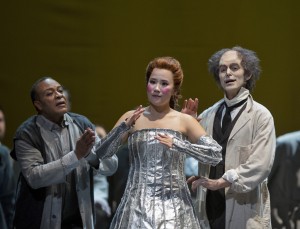 automaton that he mistakes for a real girl and with whom he falls in love. In the second story, Hoffmann is in love with another singer, Antonia (soprano Natalie Dessay). She is cursed with a fatal illness that will kill her unless she stops singing. Dr. Miracle, an incarnation of the evil Lindorf, persuades Antonia that singing will actually cure her. Instead, it leads to her unfortunate death. As Act Two, it stands out for its abundance of lyrical duets and lack of chorus. In the third story, Hoffmann makes the mistake of falling for a Venetian courtesan, Giulietta (mezzo-soprano Irene Roberts). She is wooed away by another, leaving Hoffmann alone.
automaton that he mistakes for a real girl and with whom he falls in love. In the second story, Hoffmann is in love with another singer, Antonia (soprano Natalie Dessay). She is cursed with a fatal illness that will kill her unless she stops singing. Dr. Miracle, an incarnation of the evil Lindorf, persuades Antonia that singing will actually cure her. Instead, it leads to her unfortunate death. As Act Two, it stands out for its abundance of lyrical duets and lack of chorus. In the third story, Hoffmann makes the mistake of falling for a Venetian courtesan, Giulietta (mezzo-soprano Irene Roberts). She is wooed away by another, leaving Hoffmann alone.
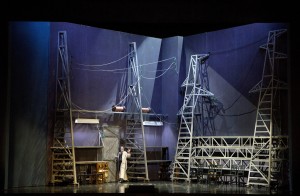 During the epilogue, the muse reveals all three false loves, as well as Stella, to be one and the same love. In order to underline the significance of this idea, some productions have cast a single singer in the role of all four female characters. Few, however, have the versatility required to sing Olympia’s technical coloratura and Giulietta’s dramatic mezzo-soprano, hence the current production’s casting of four different singers for each part. In contrast, some of the male characters who appear in multiple stories under varied guises, such as Lindorf, (also Coppelius, Dapertutto and Dr. Miracle) and the servant Frantz (also Andres, Cochenille and Pittichinaccio), are played by just one singer, thereby highlighting the continuity and persistence of their characters.
During the epilogue, the muse reveals all three false loves, as well as Stella, to be one and the same love. In order to underline the significance of this idea, some productions have cast a single singer in the role of all four female characters. Few, however, have the versatility required to sing Olympia’s technical coloratura and Giulietta’s dramatic mezzo-soprano, hence the current production’s casting of four different singers for each part. In contrast, some of the male characters who appear in multiple stories under varied guises, such as Lindorf, (also Coppelius, Dapertutto and Dr. Miracle) and the servant Frantz (also Andres, Cochenille and Pittichinaccio), are played by just one singer, thereby highlighting the continuity and persistence of their characters.
Undergirding such a complex plot is Offenbach’s playful and lush orchestration, which includes music for the harp, and challenging vocal settings – above all, Olympia’s famous “Doll Song” (“Les oiseaux dans le charmille”). Young soprano Hye Jung Lee’s virtuosic performance of “The Doll Song” was, for this reviewer, the 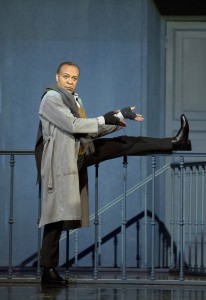 highlight of SFO’s current production. The beauty of the vocal setting with its ascending and descending lines, the technical mastery required to sing them, the perfect control with which Ms. Lee executes them, her dramatic ornamentations, youthful energy and humorous touch all combine to make this one of the most overwhelming and unforgettable of experiences.
highlight of SFO’s current production. The beauty of the vocal setting with its ascending and descending lines, the technical mastery required to sing them, the perfect control with which Ms. Lee executes them, her dramatic ornamentations, youthful energy and humorous touch all combine to make this one of the most overwhelming and unforgettable of experiences.
Adding to the enjoyment of “The Doll Song” is the production’s special effects. Because Olympia is not a real person, she sits on a mechanical chair operated from the shadows by three stagehands. As the notes she sings rise and fall, so is she lifted and lowered. For the final high note, Olympia’s chair is thrust forward, leaving her suspended directly above the orchestra pit. In a slightly later scene, Olympia glides across the crowded dance floor on rollerblades, carefully hidden under her flowing frock.
Polenzani is consistently brilliant in the role of Hoffmann, putting in a seemingly effortless performance. Especially memorable is Polenzani’s rendering of Offenbach’s playful “Kleinzach Song” with its repetitive onomatopoeia that even a child could enjoy. First sung during the Prologue, it reappears in the Epilogue, 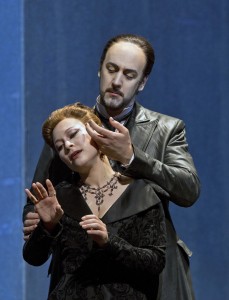 bookending the three tales of the middle section. Tenor Steven Cole, too, shines in his many manifestations of the servant role in Tales of Hoffmann. Though he mostly has small bit parts, each is rendered with characteristic humor that enlivens the drama and drives it forward. In his one short aria during Act Two, Cole pretends not to have any vocal ability, yet it’s obvious that he is a talented and experienced performer.
bookending the three tales of the middle section. Tenor Steven Cole, too, shines in his many manifestations of the servant role in Tales of Hoffmann. Though he mostly has small bit parts, each is rendered with characteristic humor that enlivens the drama and drives it forward. In his one short aria during Act Two, Cole pretends not to have any vocal ability, yet it’s obvious that he is a talented and experienced performer.
San Francisco Opera’s production seems sure to set new standards for the interpretation of Offenbach’s Tales of Hoffmann. Director and costume designer Laurent Pelly together with set designer Chantal Thomas have created a production both traditional and contemporary that captures the aesthetic of the period. The superlative cast breathes enormous energy and vitality into Hoffmann’s macabre and fantastical stories, rendering Offenbach’s playful opera an absolute delight.
photos © Cory Weaver/San Francisco Opera
Les Contes d’Hoffmann (The Tales of Hoffmann)
San Francisco Opera
War Memorial Opera House
scheduled to end on July 6, 2013
for tickets, call (415) 864-3330 or visit http://www.sfopera.com

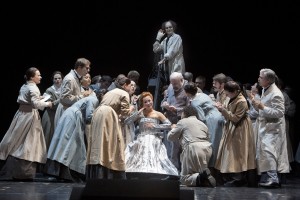

{ 1 comment… read it below or add one }
I hope the public can view this production of Hoffman on PBS TV in the near future. Public contributions to the S.F. Opera would be forthcoming.